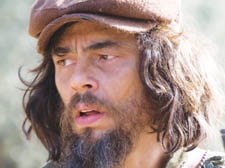|
|
 |
| |

Benicio del Toro in Che: Part One |
Of revolution and cigar smoke
CHE: PART ONE
Directed by Steven Soderbergh
Certificate 15
STEVEN Soderbergh decided to divide his story of the life and times of Che Guevara into two films, as he felt there was so much material it would do the revolutionary hero a grave injustice if he squeezed it all into one long epic.
This fact makes the absence of any depth to Part One of this duet all the more mystifying.
The plot jumps from the hills of the Sierra Maestra, where Fidel’s band of merry men stalk Batista’s troops, to Che’s explosive address at the UN in the early 1960s.
All the narrative is told through swirls of cigar smoke with damp mountains and sweat- stained combat fatigues.
It is all rather macho, the only woman with a speaking part appears two- thirds of the way through and is clearly intended as little more than a love interest for our hunky hero, not as a sister in arms.
Still I suppose we should be happy that the legend of Che is being told again. His story should still be an inspiration to those who want to fight imperialism.
Yet it doesn’t really work as a bio-pic, political treatise or war film.
It imagines the viewer has sufficient knowledge of Che and Fidel to mean no back story of his political conversion is necessary. It lacks any meaningful critique of what the Cuban revolution was all about, aside from some lip-service to the rebels promising agrarian reform, and the long gun battles do not quite hold the attention (and, after all, we know who won).
We start with a meeting in Mexico between Fidel and Che and a host of other rebels. Castro tells his recruit that he has no boat, no money and fewer than 20 men, but he will change all that. His immense self-belief inspires Che and the film starts with Che saying he wants to join the struggle, and will take on the role as the rebels’ doctor. He soon proves himself in the field and becomes a fighter, before finally becoming the revolutionary hero.
This is at times sentimental but in terms of balancing the vile press Che Guevara received, it’s a drop in the ocean. It also tries to deal with thorny questions, such the allegations that he shot deserters and those who wavered from the strict revolutionary code Fidel Castro insisted upon.
However, the ethics of killing those who disagree with you – and the revolutionary aims being more important than the sanctity of human life – are not discussed at any length. Instead, the scenes show he and his comrades did mete out revolutionary justice to those who abused their positions as armed fighters. A scene where he oversees the execution of two men charged with robbery and rape is meant to paint him in a sympathetic light.
Benicio Del Toro (pictured) is adequate, although heavier set than Che and certainly less attractive. Still, he has the intensity required as the poster boy of the 1960s.
Author John Lee Anderson was on board as a consultant. His biography of Guevara is a superb read, clinically researched, lushly written. It’s a shame some of his magic hasn’t rubbed off on Soderbergh. In terms of both learning about the revolution, and in sheer enjoyment, it knocks the beret clean off the head of this film. |
 |
|
 |
| |
|
 |
|

